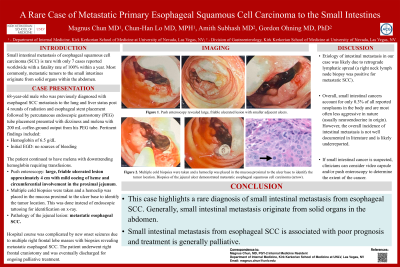Tuesday Poster Session
Category: Esophagus
P3965 - A Rare Case of Metastatic Primary Esophageal Squamous Cell Carcinoma to the Small Intestine
Tuesday, October 29, 2024
10:30 AM - 4:00 PM ET
Location: Exhibit Hall E

Has Audio
.jpg)
Magnus Chun, MD
Kirk Kerkorian School of Medicine at the University of Nevada
Las Vegas, NV
Presenting Author(s)
Magnus Chun, MD, Chun-Han Lo, MD, MPH, Amith Subhash, MD, Gordon Ohning, MD, PhD
Kirk Kerkorian School of Medicine at the University of Nevada, Las Vegas, NV
Introduction: Small intestinal metastasis of esophageal squamous cell carcinoma (SCC) is rare with only 7 cases reported worldwide with a fatality rate of 100% within a year. Most commonly, metastatic tumors to the small intestines originate from solid organs within the abdomen. We present a rare case of metastatic jejunal cancer from a primary esophageal SCC.
Case Description/Methods: A 68-year-old Asian man who was previously diagnosed with esophageal SCC presented to the hospital with dizziness, weakness, and melena. Esophageal SCC was diagnosed approximately three months prior after presenting with both solid food and liquid dysphagia. He underwent radiation therapy, but continued to have dysphagia symptoms eventually requiring esophagogastroduodenoscopy (EGD) with esophageal stent placement followed by percutaneous gastrostomy tube placement. Patient was subsequently admitted for onset of melena and 200mL coffee-ground output from his gastrostomy tube. Laboratory studies were notable for a hemoglobin of 6.9 g/dL. EGD was performed which did not reveal a source of bleeding and he continued to have melena requiring transfusion. Push enteroscopy was performed and a large 4cm ulcer with several smaller adjacent ulcers within the proximal jejunum was identified. Targeted biopsies were obtained from the jejunal ulcer and pathology demonstrated metastatic esophageal SCC (Figure 1A-C). Hospital course was complicated by new onset seizures due to multiple right frontal lobe masses with biopsies revealing metastatic esophageal SCC. The patient underwent right frontal craniotomy and was eventually discharged for ongoing palliative treatment.
Discussion: This case highlights a rare diagnosis of small intestinal metastasis from esophageal SCC. Overall, small intestine cancers account for only 0.3% of all reported neoplasms in the body and are most often less aggressive in nature (usually neuroendocrine in origin). However, the overall incidence of intestinal metastasis is not well documented in literature and is likely underreported. The etiology of our patient’s intestinal metastasis is suspected to be due to retrograde lymphatic spread, as a right neck lymph node biopsy was positive for metastatic SCC. The presentation of metastatic esophageal SCC is associated with poor prognosis and the goal of treatment is generally palliative. If small intestinal cancer is suspected, clinicians can consider computed tomography enterography and/or push enteroscopy to determine the extent of the cancer.

Disclosures:
Magnus Chun, MD, Chun-Han Lo, MD, MPH, Amith Subhash, MD, Gordon Ohning, MD, PhD. P3965 - A Rare Case of Metastatic Primary Esophageal Squamous Cell Carcinoma to the Small Intestine, ACG 2024 Annual Scientific Meeting Abstracts. Philadelphia, PA: American College of Gastroenterology.
Kirk Kerkorian School of Medicine at the University of Nevada, Las Vegas, NV
Introduction: Small intestinal metastasis of esophageal squamous cell carcinoma (SCC) is rare with only 7 cases reported worldwide with a fatality rate of 100% within a year. Most commonly, metastatic tumors to the small intestines originate from solid organs within the abdomen. We present a rare case of metastatic jejunal cancer from a primary esophageal SCC.
Case Description/Methods: A 68-year-old Asian man who was previously diagnosed with esophageal SCC presented to the hospital with dizziness, weakness, and melena. Esophageal SCC was diagnosed approximately three months prior after presenting with both solid food and liquid dysphagia. He underwent radiation therapy, but continued to have dysphagia symptoms eventually requiring esophagogastroduodenoscopy (EGD) with esophageal stent placement followed by percutaneous gastrostomy tube placement. Patient was subsequently admitted for onset of melena and 200mL coffee-ground output from his gastrostomy tube. Laboratory studies were notable for a hemoglobin of 6.9 g/dL. EGD was performed which did not reveal a source of bleeding and he continued to have melena requiring transfusion. Push enteroscopy was performed and a large 4cm ulcer with several smaller adjacent ulcers within the proximal jejunum was identified. Targeted biopsies were obtained from the jejunal ulcer and pathology demonstrated metastatic esophageal SCC (Figure 1A-C). Hospital course was complicated by new onset seizures due to multiple right frontal lobe masses with biopsies revealing metastatic esophageal SCC. The patient underwent right frontal craniotomy and was eventually discharged for ongoing palliative treatment.
Discussion: This case highlights a rare diagnosis of small intestinal metastasis from esophageal SCC. Overall, small intestine cancers account for only 0.3% of all reported neoplasms in the body and are most often less aggressive in nature (usually neuroendocrine in origin). However, the overall incidence of intestinal metastasis is not well documented in literature and is likely underreported. The etiology of our patient’s intestinal metastasis is suspected to be due to retrograde lymphatic spread, as a right neck lymph node biopsy was positive for metastatic SCC. The presentation of metastatic esophageal SCC is associated with poor prognosis and the goal of treatment is generally palliative. If small intestinal cancer is suspected, clinicians can consider computed tomography enterography and/or push enteroscopy to determine the extent of the cancer.

Figure: Biopsies of the jejunal ulcer demonstrated metastatic esophageal squamous cell carcinoma
Disclosures:
Magnus Chun indicated no relevant financial relationships.
Chun-Han Lo indicated no relevant financial relationships.
Amith Subhash indicated no relevant financial relationships.
Gordon Ohning indicated no relevant financial relationships.
Magnus Chun, MD, Chun-Han Lo, MD, MPH, Amith Subhash, MD, Gordon Ohning, MD, PhD. P3965 - A Rare Case of Metastatic Primary Esophageal Squamous Cell Carcinoma to the Small Intestine, ACG 2024 Annual Scientific Meeting Abstracts. Philadelphia, PA: American College of Gastroenterology.
